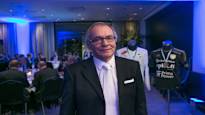European Football Championships on channels 14.6.–14.7. Go to the competition website from this link.
In the European football championships, Hungary is the head coach Marco Rossi. The 59-year-old Italian first arrived in Hungary as the head coach of the Budapest club team Honvedi.
In the 2016–17 season, Rossi returned Honvedi to his country’s champion since the early 1990s.
A journalist in ‘s studio before the match between Germany and Hungary Riku Salminen posed a question to the experts To Erkka V. Lehtola and Juho Rantala:
– Is there any information, who was Honvedi’s previous master coach?
– Riku, there’s not enough room for two here. Two uncles are sitting here. And we both know the answer, Lehtola laughed.
After that, a legend stepped into ‘s studio from the middle of the smoke screen, Martti Kuusela.
Kuusela, 78, known as the “soccer professor”, is also remembered for the past prestigious competitions from the studios.
Above all, however, Kuusela is the most internationally successful Finnish football coach.
– Healthy junior, Kuusela snapped at Lehtola after his jubilant entrance.
– Thanks thanks. It’s nice that someone still calls me junior here. That’s all for home.
Nowadays, Kuusela follows ten matches a week as well as the practices of his grandchildren, aged 6 and 11.
– I asked them that “could grandpa give you some advice”. They said “no, listen, grandpa, the coaches know better than you”, Kuusela smiled and continued:
– This is exactly how it should be. You have to listen to the coaches.
‘s studio showed clips of history from the days when Kuusela coached Honvedi to the Hungarian championship.
The Finnish coach was not trusted in the traditional football country, but Kuusela achieved authority and respect.
The chairman of the club didn’t believe in Kuusela either. On the other hand, relations with the Belgian owners were good. The Finn was able to make a more cohesive bunch of skilled artists, and the good results provided protection.
– I don’t care what they think. I just do as (Belgian owner) Louis de Vries says. Whether we agree with him or not, Kuusela stated in an interview in the early 1990s.
Kuusela said that he feels like a “cattle breeder”. For the Hungarians, the tough coaching line was a shock. Therefore, Kuusela was called both a whipper and a ski coach.
– The biggest so-called complainers end up on the bench. The good results are due to the fact that I found the right playing positions for the players.
In ‘s studio, a piece of history drew Kuusela’s eyes to be sensitized.
– It’s almost speechless. Yes, it was a great time.
– It’s just that I had to work harder than normal for them to accept me. The most important thing was that the players accepted. I brought them quite a lot of new things, such as the fact that the morning after the game was not free, but had to be practiced. It wasn’t very nice for them.
Kuusela recalled that the players were brilliant, especially in their technical skills.
– And they learn to run a little too.
– A little…, Lehtola interjected.
Kuusela’s reactions to the piece of history are shown in the video in place of the story’s main picture.
Kuusela had brought Honvedi’s 1993 championship 30-year commemorative award to the studio.
The coaching legend said that Honved remembers his former coach very well. Every year, for example, there are birthday greetings. Journalists from Hungary are also calling.
It’s a lot of fun to go abroad in search of success as a Finnish coach. Erkka V. Lehtolakin remembers the “ski coach in football country” headlines from Kuusela 30 years ago.
– You can tell what those prejudices are like when someone comes from Finland to tell you how to play futsal.
For example, the exercises after the game day were progressive, because it was only introduced in Europe in the 21st century, Juho Rantala pointed out.
– And there is rarely a coach from whom all people remember how warmly he has always received – it doesn’t matter if you have won zero or six championships.
Wednesday’s broadcast also returned to Kuusela’s days as a TV expert. Times, graphics, styles and customs have changed, but teaching the game continues.
Germany–Hungary was a clear choice for Kuusela’s visit to this year’s EC studio.
– Hungary is a very important country for me, but I learned football in Germany. One that Erkka remembers saying that we ran a little too much, it came from Germany. When I was at school in Cologne – and I was a fit player too – I never ran as much as the coaches there ran.
Born: 9 October 1945 in Rovaniemi.
Played as a midfielder In RoPS, HIFK, OTP, Ilves, HJK, Haka and Mikkelin Palloilijoi. Two A national matches.
As a player In HIFK, SM silver 1971 and SM bronze 1970.
Coaching career:
Studied after his playing career in Cologne, Germany and completed his Fussball-Lehrer degree.
1979–1987: He coached GrIFK, HJK and the A national team in Finland, which he led to within two points of second place in the qualifying group and the 1986 World Championships.
1989: You coached a club in Denmark called Boldklubben 1903 (now FC Copenhagen).
1990: HJK.
1990–1991: Belgian KFC Germinal Beerschot.
1992–1994: Budapest Honved.
1994–1997: Coached in Greece, Cyprus and Finland at FinnPa.
2001: Coached the Greek Panionios FC for about half a year, until he was fired.
2005: Coached Aris FC in Greece.
2008: Returned to coaching duties at TPS.
Championship gold in HJK in 1981 and 1990. Hungarian championship in 1993. Coach of the year in Finland in 1985.
Elected to the Finnish Football Association’s honorary club in 2007 and to the Finnish football Hall of Fame in 2016. Received the 2015 Pro Urheilu medal.
